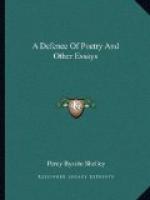The mind thus acquires, by exercise, a habit, as it were, of perceiving and abhorring evil, however remote from the immediate sphere of sensations with which that individual mind is conversant. Imagination or mind employed in prophetically imaging forth its objects, is that faculty of human nature on which every gradation of its progress, nay, every, the minutest, change, depends. Pain or pleasure, if subtly analysed, will be found to consist entirely in prospect. The only distinction between the selfish man and the virtuous man is, that the imagination of the former is confined within a narrow limit, whilst that of the latter embraces a comprehensive circumference. In this sense, wisdom and virtue may be said to be inseparable, and criteria of each other. Selfishness is the offspring of ignorance and mistake; it is the portion of unreflecting infancy, and savage solitude, or of those whom toil or evil occupations have blunted or rendered torpid; disinterested benevolence is the product of a cultivated imagination, and has an intimate connexion with all the arts which add ornament, or dignity, or power, or stability to the social state of man. Virtue is thus entirely a refinement of civilized life; a creation of the human mind; or, rather, a combination which it has made, according to elementary rules contained within itself, of the feelings suggested by the relations established between man and man.
All the theories which have refined and exalted humanity, or those which have been devised as alleviations of its mistakes and evils, have been based upon the elementary emotions of disinterestedness, which we feel to constitute the majesty of our nature. Patriotism, as it existed in the ancient republics, was never, as has been supposed, a calculation of personal advantages. When Mutius Scaevola thrust his hand into the burning coals, and Regulus returned to Carthage, and Epicharis sustained the rack silently, in the torments of which




